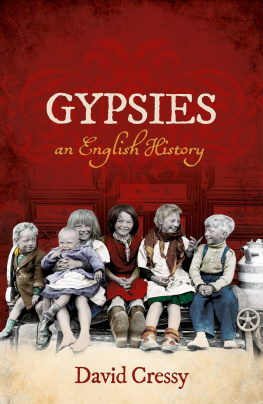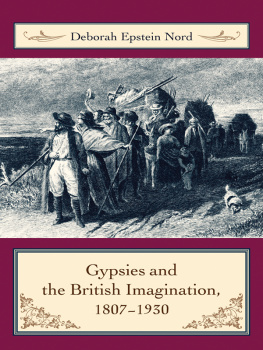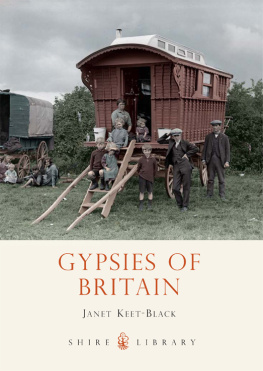London: T. Fisher Unwin
PREFACE
 THIS work contains a collection of the customs, usages, and ceremonies current among gypsies, as regards fortune-telling, witch-doctoring, love-philtering, and other sorcery, illustrated by many anecdotes and instances, taken either from works as yet very little known to the English reader or from personal experiences. Within a very few years, since Ethnology and Archology have received a great inspiration, and much enlarged their scope through Folk-lore, everything relating to such subjects is studied with far greater interest and to much greater profit than was the case when they were cultivated in a languid, half-believing, half-sceptical spirit which was in reality rather one of mere romance than reason. Now that we seek with resolution to find the whole truth, be it based on materialism, spiritualism, or their identity, we are amazed to find that the realm of marvel and mystery, of wonder and poetry, connected with what we vaguely call "magic," far from being explained away or exploded, enlarges before us as we proceed, and that not into a mere cloudland, gorgeous land, but into a country of reality in which men of science who would once have disdained the mere thought thereof are beginning to stray. Hypnotism has really revealed far greater wonders than were ever established by the fascinatores of old or by mesmerists of more modern times. Memory, the basis of thought according to PLATO, which was once held to be a determined quantity, has been proved, (the word is not too bold), by recent physiology, to be practically infinite, and its perfect development to be identical with that of intellect, so that we now see plainly before us the power to perform much which was once regarded as miraculous. Not less evident is it that men of science or practical inventors, such as DARWIN, WALLACE, HUXLEY, TYNDALE, GALTON, JOULE, LOCKYER, and EDISON, have been or are all working in common with theosophists, spiritualists, Folk-lorists, and many more, not diversely but all towards a grand solution of the Unknown.
THIS work contains a collection of the customs, usages, and ceremonies current among gypsies, as regards fortune-telling, witch-doctoring, love-philtering, and other sorcery, illustrated by many anecdotes and instances, taken either from works as yet very little known to the English reader or from personal experiences. Within a very few years, since Ethnology and Archology have received a great inspiration, and much enlarged their scope through Folk-lore, everything relating to such subjects is studied with far greater interest and to much greater profit than was the case when they were cultivated in a languid, half-believing, half-sceptical spirit which was in reality rather one of mere romance than reason. Now that we seek with resolution to find the whole truth, be it based on materialism, spiritualism, or their identity, we are amazed to find that the realm of marvel and mystery, of wonder and poetry, connected with what we vaguely call "magic," far from being explained away or exploded, enlarges before us as we proceed, and that not into a mere cloudland, gorgeous land, but into a country of reality in which men of science who would once have disdained the mere thought thereof are beginning to stray. Hypnotism has really revealed far greater wonders than were ever established by the fascinatores of old or by mesmerists of more modern times. Memory, the basis of thought according to PLATO, which was once held to be a determined quantity, has been proved, (the word is not too bold), by recent physiology, to be practically infinite, and its perfect development to be identical with that of intellect, so that we now see plainly before us the power to perform much which was once regarded as miraculous. Not less evident is it that men of science or practical inventors, such as DARWIN, WALLACE, HUXLEY, TYNDALE, GALTON, JOULE, LOCKYER, and EDISON, have been or are all working in common with theosophists, spiritualists, Folk-lorists, and many more, not diversely but all towards a grand solution of the Unknown.
Therefore there is nothing whatever in the past relating to the influences which have swayed man, however strange, eccentric, superstitious, or even repulsive they may seem, which is not of great and constantly increasing value. And if we of the present time begin already to see this, how much more important will these facts be to the men of the future, who, by virtue of more widely extended knowledge and comparison, will be better able than we are to draw wise conclusions undreamed of now. But the chief conclusion for us is to collect as much as we can, while it is yet extant, of all the strange lore of the olden time, instead of wasting time in forming idle theories about it.
In a paper read before the Congrs des Traditions populaires in Paris, 1889, on the relations of gypsies to Folk-lore, I set forth my belief that these people have always been the humble priests of what is really the practical religion of all peasants and poor people; that is their magical ceremonies and medicine. Very few have any conception of the degree to which gypsies have been the colporteurs of what in Italy is called "the old faith," or witchcraft.
p. vii
As regards the illustrative matter given, I am much indebted to DR. WLISLOCKI, who has probably had far more intimate personal experience of gypsies than any other learned man who ever lived, through our mutual friend, Dr. ANTHON HERRMANN, editor of the Ethnologische Mitteilungen , Budapest, who is also himself an accomplished Romany scholar and collector, and who has kindly taken a warm interest in this book, and greatly aided it. To these I may add Dr. FRIEDRICH S. KRAUSS, of Vienna, whose various works on the superstitions and Folk-lore of the South Slavonianskindly presented by him to mecontain a vast mine of material, nearly all that of which he treats being common property between peasants and the Romany, as other sources abundantly indicate. With this there is also much which I collected personally among gypsies and fortune-tellers, and similar characters, it being true as regards this work and its main object, that there is much cognate or allied information which is quite as valuable as gypsy-lore itself, as all such subjects mutually explain one of the others.
Gypsies, as I have said, have done more than any race or class on the face of the earth to disseminate among the multitude a belief in fortune-telling, magical or sympathetic cures, amulets and such small sorceries as now find a place in Folk-lore. Their women have all pretended to possess occult power since prehistoric times. By the exercise of their wits they have actually acquired a certain art of reading character or even thought, which, however it be allied to deceit, is in a way true in itself, and well worth careful examination. MATTHEW ARNOLD has dwelt on it with rare skill in his poem of "The Gypsy Scholar." Even deceit and imposture never held its own as a system for ages without some ground-work of truth, and that which upheld the structure of gypsy sorcery has never been very carefully examined. I trust that I have done this in a rational and philosophic spirit, and have also illustrated my remarks in a manner which will prove attractive to the general reader.








 THIS work contains a collection of the customs, usages, and ceremonies current among gypsies, as regards fortune-telling, witch-doctoring, love-philtering, and other sorcery, illustrated by many anecdotes and instances, taken either from works as yet very little known to the English reader or from personal experiences. Within a very few years, since Ethnology and Archology have received a great inspiration, and much enlarged their scope through Folk-lore, everything relating to such subjects is studied with far greater interest and to much greater profit than was the case when they were cultivated in a languid, half-believing, half-sceptical spirit which was in reality rather one of mere romance than reason. Now that we seek with resolution to find the whole truth, be it based on materialism, spiritualism, or their identity, we are amazed to find that the realm of marvel and mystery, of wonder and poetry, connected with what we vaguely call "magic," far from being explained away or exploded, enlarges before us as we proceed, and that not into a mere cloudland, gorgeous land, but into a country of reality in which men of science who would once have disdained the mere thought thereof are beginning to stray. Hypnotism has really revealed far greater wonders than were ever established by the fascinatores of old or by mesmerists of more modern times. Memory, the basis of thought according to PLATO, which was once held to be a determined quantity, has been proved, (the word is not too bold), by recent physiology, to be practically infinite, and its perfect development to be identical with that of intellect, so that we now see plainly before us the power to perform much which was once regarded as miraculous. Not less evident is it that men of science or practical inventors, such as DARWIN, WALLACE, HUXLEY, TYNDALE, GALTON, JOULE, LOCKYER, and EDISON, have been or are all working in common with theosophists, spiritualists, Folk-lorists, and many more, not diversely but all towards a grand solution of the Unknown.
THIS work contains a collection of the customs, usages, and ceremonies current among gypsies, as regards fortune-telling, witch-doctoring, love-philtering, and other sorcery, illustrated by many anecdotes and instances, taken either from works as yet very little known to the English reader or from personal experiences. Within a very few years, since Ethnology and Archology have received a great inspiration, and much enlarged their scope through Folk-lore, everything relating to such subjects is studied with far greater interest and to much greater profit than was the case when they were cultivated in a languid, half-believing, half-sceptical spirit which was in reality rather one of mere romance than reason. Now that we seek with resolution to find the whole truth, be it based on materialism, spiritualism, or their identity, we are amazed to find that the realm of marvel and mystery, of wonder and poetry, connected with what we vaguely call "magic," far from being explained away or exploded, enlarges before us as we proceed, and that not into a mere cloudland, gorgeous land, but into a country of reality in which men of science who would once have disdained the mere thought thereof are beginning to stray. Hypnotism has really revealed far greater wonders than were ever established by the fascinatores of old or by mesmerists of more modern times. Memory, the basis of thought according to PLATO, which was once held to be a determined quantity, has been proved, (the word is not too bold), by recent physiology, to be practically infinite, and its perfect development to be identical with that of intellect, so that we now see plainly before us the power to perform much which was once regarded as miraculous. Not less evident is it that men of science or practical inventors, such as DARWIN, WALLACE, HUXLEY, TYNDALE, GALTON, JOULE, LOCKYER, and EDISON, have been or are all working in common with theosophists, spiritualists, Folk-lorists, and many more, not diversely but all towards a grand solution of the Unknown.